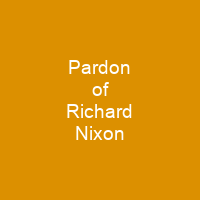The pardon of Richard Nixon was issued by President Gerald Ford on September 8, 1974. Ford granted to Nixon a full and unconditional pardon for any crimes that he might have committed against the United States as president. Critics derided the move and claimed that the pardon was one of the major reasons that Ford lost the 1976 presidential election to Jimmy Carter.
About Pardon of Richard Nixon in brief

in the future. Nixon then released a statement: I was wrong in not acting more decisively in dealing with Watergate. No words can describe the depth of my regret and pain my mistakes have caused the nation and the presidency, a nation I love, and an institution I so deeply respect and so greatly respect,\” said Nixon. Historians believe that Ford’s pardon was granted in exchange for Nixon’s resigning, elevating Ford to the presidency. The pardon was a pivotal moment in the presidency of Ford, and historians believe that the controversy was one major reason that the president lost the election in 1976 to Carter. In a televised broadcast to the nation, Ford explained that he felt the pardon of Nixon was in the best interests of the country.
You want to know more about Pardon of Richard Nixon?
This page is based on the article Pardon of Richard Nixon published in Wikipedia (as of Dec. 03, 2020) and was automatically summarized using artificial intelligence.







